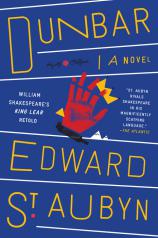Dunbar
Review
Dunbar
Patterned after Shakespeare’s most destructive family story, “King Lear,” Edward St. Aubyn’s newest work introduces the world to Henry Dunbar, an international media mogul. Dunbar, conceivably the world’s most powerful man, has had second thoughts about his decision a year earlier to turn over control of his companies to his older daughters, Abby and Megan. The novel opens as an alcoholic friend, Peter Walker (the Fool), helps Dunbar break out of a closely monitored health facility in England. Abby and Megan have sequestered him there to prevent his interference in their takeover. At the same time in America, the youngest daughter, Florence, begins an earnest search for him, wishing to make amends and restore his health, equilibrium and their relationship.
Dunbar and Walker escape into a deadly blizzard, and the older sisters come to England to find him. Florence comes to England as well, and the pace of the novel is heightened by the cat-and-mouse game Dunbar must play to avoid capture. When at last he returns to New York to attend the business meeting that will determine control of his incredible wealth, he waits with Florence, accepting and returning her love. The outcomes of DUNBAR and “King Lear” remain parallel.
"Edward St. Aubyn’s choice to move King Lear to our century is a triumph. Even though the tragedy is achingly familiar, the prose is beautifully fresh and surprising."
Why read a story we already know? A short answer is that we relearn the lessons of a contemporary telling of King Lear’s losses; through Dunbar, Lear’s tragic life is brought into the 21st century, highlighting his frailty as he descends into our world’s peculiar madness. For example, Dunbar narrates his own insanity as he escapes through the tortuous winter hills and storms, blinding snow, and close escape from discovery in bales of hay in a farmer’s dairy barn. He falls and drags his body from one valley to another, anguishing over being alive and the betrayal of his older daughters. He invites that child-devouring sky-god to do his worst, “to rain down information from his satellites, to stream his audiovisual hell of white noise and burning bodies straight into his fragile brain, to strangle him with a word noose.” The next thing that happened was that he forgot the last thing that happened.
Another example of Dunbar’s insanity connected to the modern world is seen when he and Florence fly back to New York in a commercial jet. He slips into an abstracted state, as if he were looking at a screen behind the eyes on which an alternative story was being projected. Florence sees the unfolding of the last months and the anticipated trauma of the oncoming days when he would fight for his autonomy like Exit signs in a darkened cinema. They couldn’t be expected to compete with something as absorbing as the film itself.
St. Aubyn’s novel reminds us that Dunbar alone changes throughout the course of a few days. One of his earlier reflections while still in the sanitarium centered on sleep. “Of nature’s great mistakes, he thought, sleep had always struck him as the most outrageous, even harder to explain than altruism: three hours or, in the case of the truly lost, eight hours in which it was impossible to make any money.” Dunbar later brushes aside thoughts of making more money to enrich his empire and wants instead to live peacefully in Montana with Florence. Another proof of his change is his encounter with Simon, the pouf priest, when he recalls the newspaper title, “Gay Vicar Puts Lead in His Pencil,” and Dunbar imagines he would beg forgiveness, one after another, of all the people he had harmed. Seeing Dunbar’s possible redemption through St. Aubyn’s telling is vibrant and heartening.
And, most poignantly, at the very end of Florence’s life, as Dunbar watches her painfully slipping away, he offers everything: every organ in his body, unbuttoning his shirt. “I want to donate…” Dunbar understands his past, and he regrets it.
Edward St. Aubyn’s choice to move King Lear to our century is a triumph. Even though the tragedy is achingly familiar, the prose is beautifully fresh and surprising.
Reviewed by Jane Krebs on October 13, 2017
Dunbar
- Publication Date: July 24, 2018
- Genres: Fiction
- Paperback: 256 pages
- Publisher: Hogarth
- ISBN-10: 1101904305
- ISBN-13: 9781101904305





